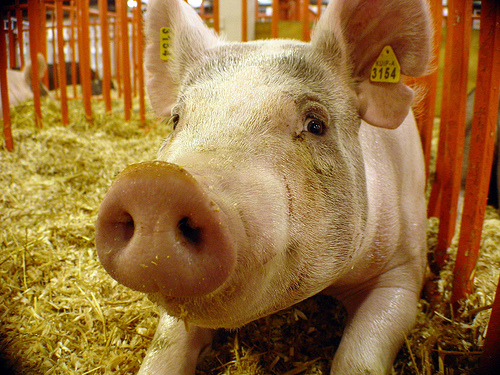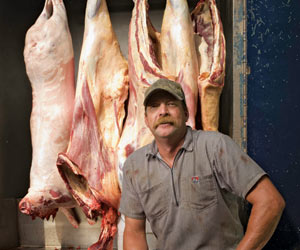
Photo courtesy of Flick user The Pug Father
Fewer little piggies are going to market, and farmers are scrambling. News of the now-ubiquitous swine flu fills the headlines (what recession?), everyone’s either got it, has symptoms, or can’t get the virus off their RSS feeds (sorry). Even the “swine” in swine flu is presenting some with opportunities. The advocacy group Farm Sanctuary has taken the swine flu’s 15 minutes and released an advisory on the ills of factory farmed pork. True, the pandemic may represent a policy window for proposed legislation to better regulate mass production of pork, but officials are now saying that the flu’s name is misleading.
Also called the North American flu or the catchy “H1N1” virus, swine flu is the name that’s stuck (except in Israel where they’ve pulled the swine reference since no one eats pork in that Jewish/Muslim mess-of-a-state and apparently therefore no one would care?). Earlier today Ag secretary Tom Vilsack practically begged people to stop using “swine flu” and to start referring to the illness by its scientific name HIN1. Too bad the science didn’t work out to C3PO.
The pig part of this is confusing. The Paris-based World Organization for Animal Health points out that the virus contains avian and human components and that not a single pig so far has been found ill with the disease. The connection comes from the fact that “the virus that is circulating includes genetic components of human, avian, and swine origin” (and “avian flu” was already taken). Indeed, US Trade rep Ron Kirk confirmed: “We want to say to consumers here and abroad that there is no risk to you, there is no scientific evidence whatsoever that there is any link between consuming pork, prepared pork products, and the H1N1 virus.”
Still, despite the fact that no pigs have the virus, and that the virus isn’t spread via animals several countries have moved to ban US pork imports, including Russia and China. So I guess next time you pig out (especially if it’s on local and small ag other white meat) you can feel good about supporting a troubled market.
Meanwhile, does this let spinach off the hook for a little while?















